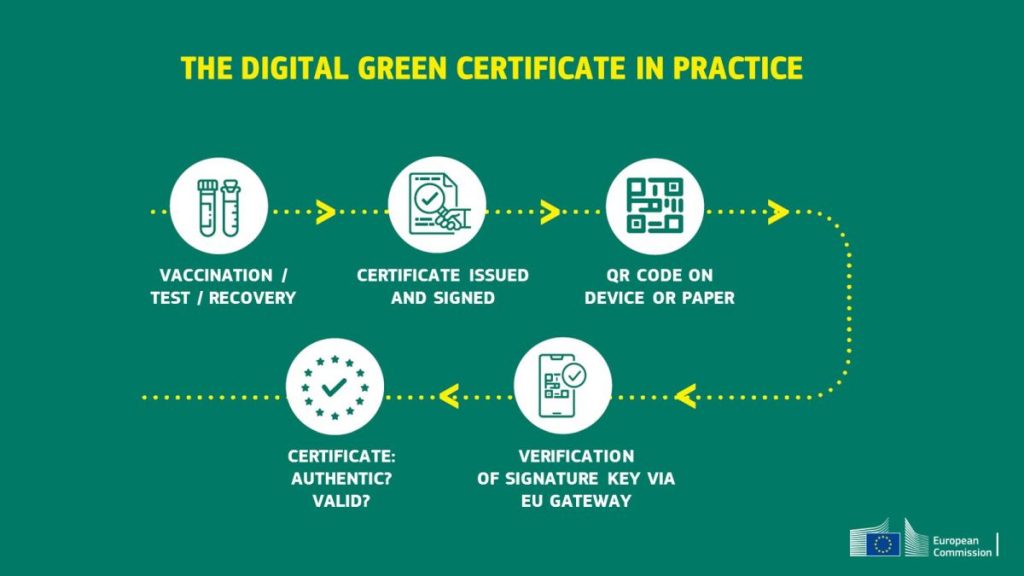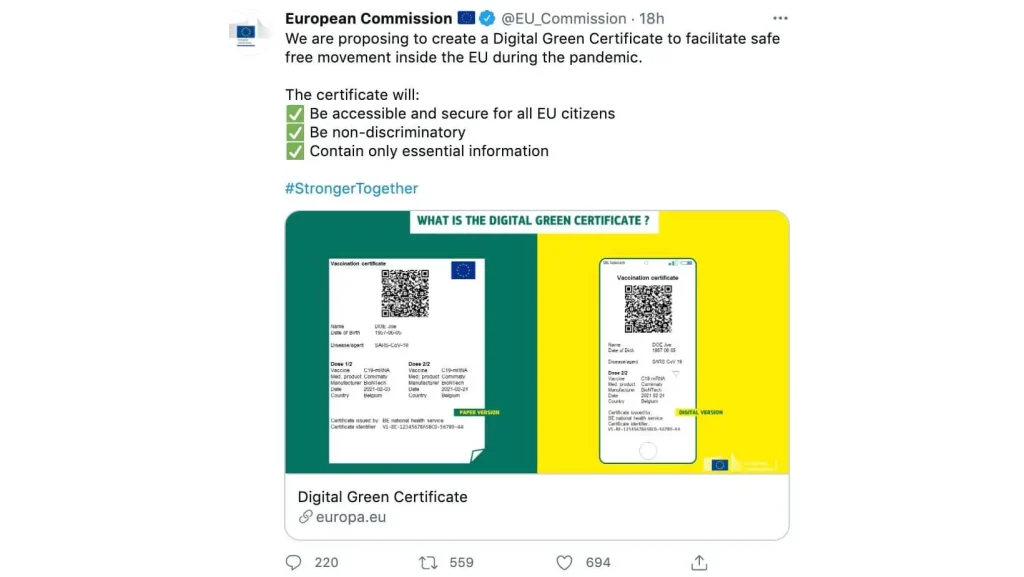HRTurizam reports that the European Commission adopted a legislative proposal to establish a common framework for digital green certificates and an additional proposal to ensure that digital green certificates are issued to third-country nationals residing in the Member States or Schengen countries and visitors entitled to travel to other Member States.
Digital green certificates are digital evidence proving that the traveler has been vaccinated against COVID-19, has recovered from it, or has a negative test result. Apart from possible uses in health care, the certificate also serves for the safe free movement of citizens of one European Union country in another.
Of course, the digital green certificate has no meaning if EU countries do not accept it. That is why the European Commission has announced that it will work closely with the European Union members. Namely, cooperation is needed to find technical solutions for the use of certificates as soon as possible. The authenticity of certificates can be verified safely throughout the EU and finally enable the mutual recognition of certificates or endorsements throughout the European Union. Member States are still responsible for deciding which public health restrictions for travelers can be lifted and will apply the same to travelers holding a digital green certificate.
Digital green certificates will meet data protection, security, and privacy requirements. For the certificates to come to life by the summer, EU member states must speed up preparations and their introduction. The European Commission will help develop a legal solution for a common framework for vaccination, testing, and recovery certificates to facilitate free movement within the EU. Member States are expected to establish technical solutions at the national level rapidly. In this way, certificates could be issued and verified securely anywhere in the European Union.
Digital green certificates should be established based on interoperability guidelines, which define common data sets and unique identifiers for vaccination certificates. A common data set for test results is already agreed upon by Member States.
Certificates will be issued in digital or paper form. Both versions will have a QR code containing the necessary basic information and a digital signature to ensure that the certificate is authentic. Certificates shall be made available free of charge in the official language or languages of the issuing Member State and English.
All persons, vaccinated and unvaccinated, should use digital green certificates when traveling within the EU. To prevent discrimination against non-vaccinated persons, the Commission proposes not only issuing an interoperable vaccination certificate but also a COVID-19 test certificate and a certificate for those who have recovered from COVID-19.
If Member States accept proof of vaccination to lift certain public health restrictions such as testing or quarantine, they would be required to accept vaccination certificates issued under the digital green certificate system under the same conditions. This obligation would be limited to vaccines authorized in the EU, but Member States may accept other vaccines.
The digital green certificate will be valid in all EU Member States and can be used by Iceland, Liechtenstein, Norway, and Switzerland. The digital green certificate should be issued to EU citizens and their family members, regardless of nationality. It should also be issued to third-country nationals residing in the EU and visitors entitled to travel to other Member States.

The digital green certificate system is a temporary measure. It will be suspended after the World Health Organization declares an end to the extraordinary public health threat caused by the COVID-19 pandemic.
For the proposal to be ready before the summer, it needs to be adopted quickly by the European Parliament and the Council. At the same time, Member States must apply the reliability framework and technical standards agreed within the eHealth network to ensure the timely introduction of digital green certificates, interoperability, and full compliance with personal data protection. The goal is to complete the technical work and proposal in the coming months.
The certificates will be available free of charge and are expected to be implemented by the summer, i.e., from 1 June.
The Minister of Tourism and Sports, Nikolina Brnjac, stated that Croatia welcomes any document that will facilitate tourist movements through uniform and predictable rules.
“The EC today adopted an important proposal for a common framework for the recognition of certificates, which should facilitate free movement during the pandemic. As a tourist country, Croatia welcomes any document that will facilitate tourist movements through uniform and predictable rules. In the forthcoming discussions in the Council, which must agree on the final version of the document, we will advocate that the announced certificate in no form constitutes a restrictive factor for free movement and that it is not discriminatory. In parallel with the preparations for adopting this document at the EU level, the Government of the Republic of Croatia regularly coordinates positions regarding border crossing conditions, taking into account the epidemiological situation in the Republic of Croatia well as in the major markets. Facilitation is also being intensively discussed with the EU Member States as well as third countries,” Brnjac said and emphasized that to ensure predictability for business entities in tourism, the Government will make a detailed decision on the conditions for entry of tourists into the Republic of Croatia, which will be in force at least until the establishment of a common European model.
For the latest travel info, bookmark our main travel info article, which is updated daily.
Read the Croatian Travel Update in your language – now available in 24 languages.
Join the Total Croatia Travel INFO Viber community.










